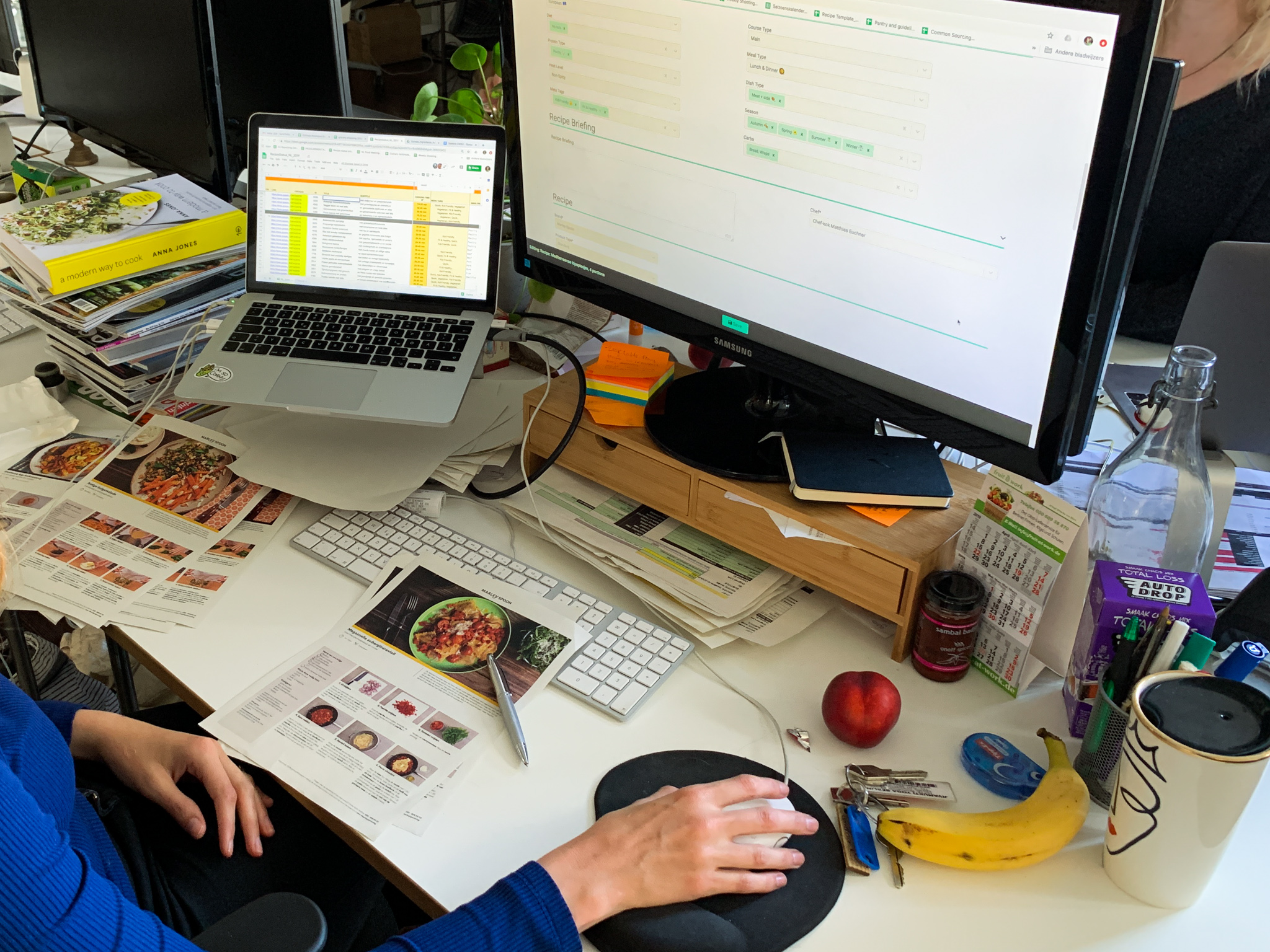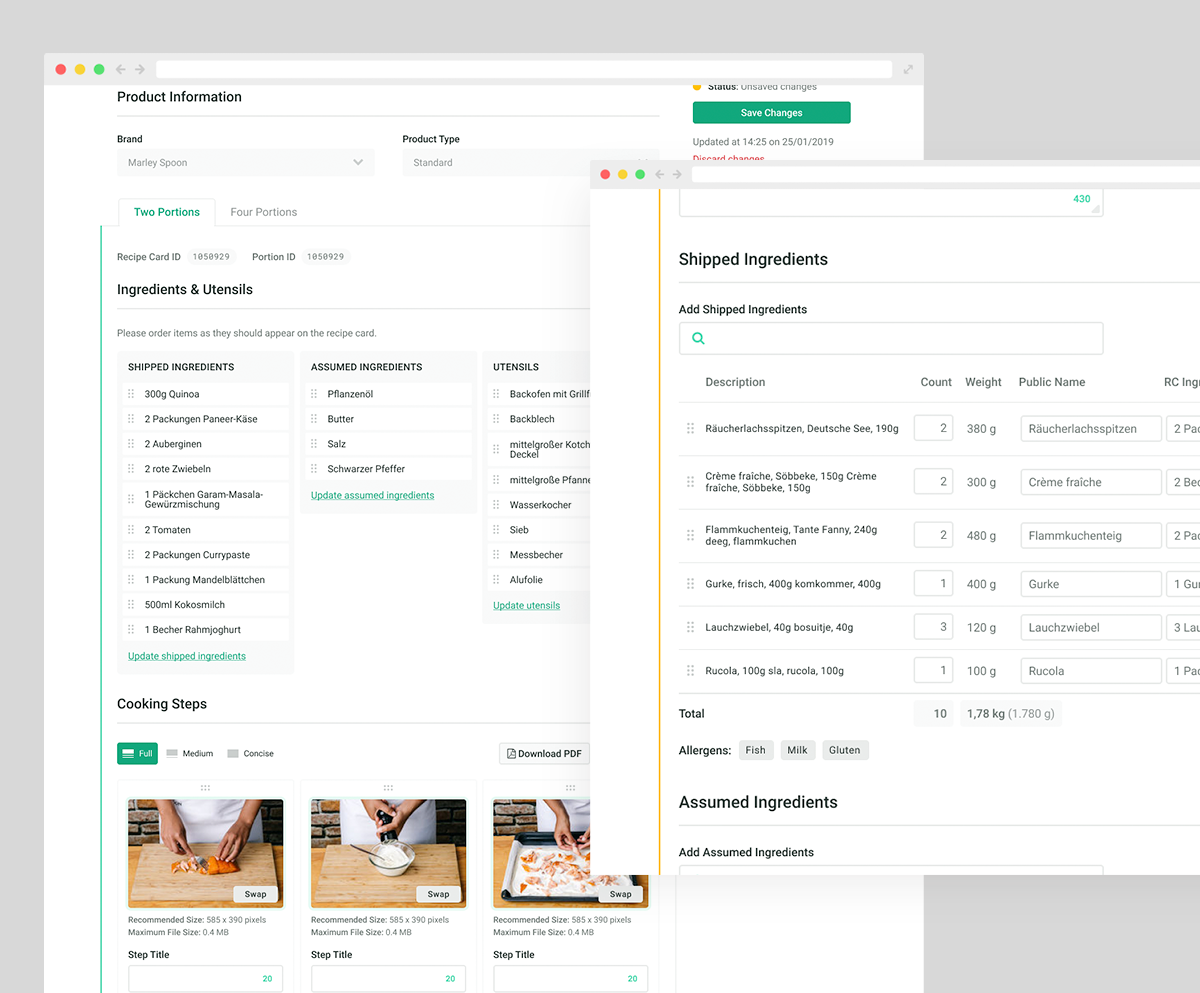Designing easier recipe and menu management for Marley Spoon’s dynamic culinary team
Organization
Marley Spoon
Role
UX Lead
Date
2019
For Marley Spoon’s dedicated culinary teams in Germany, Australia, and the United States, designing, testing, and delivering more than 20 recipes for rolling weekly menus is a relentless culinary odyssey. To get it done, the team relies on Ramen, Marley Spoon’s internal platform to support end-to-end recipe and menu management.
Marley Spoon is a multinational meal kit company that helps people save time while eating healthy, home-cooked meals. Each week, people choose meals they’d like to cook from a changing weekly menu and receive all of the ingredients and recipes they need directly to their door. Since launch, Marley Spoon has delivered 27 million meals to home cooks in three continents and eight countries around the world.
Marley Spoon’s portfolio included its flagship “Marley Spoon” brand; a brand extension in partnership with Martha Stewart; and a lower-priced brand alternative called “Dinnerly.” In practice, the company used a white label strategy for its digital assets.
When Marley Spoon launched, the business model focused on customers purchasing individual boxes on a one-off basis. It wasn’t until later in their growth that they switched to a subscription model, and expanded from offering six to twenty unique recipes in each weekly menu for each brand.
This transformation meant that the original internal software platform for managing recipes could no longer sustainably support the culinary and procurement workflows, and was a limiting factor in expanded product offerings.
In response, the company introduced Ramen, an internal platform, to support the culinary team’s recipe creation and catalogue management and to act as the backbone for critical long-term strategic initiatives. Simply put, Ramen helps the culinary team manage everything related to ingredients, recipes, and weekly menus.
When I joined Marley Spoon, the Ramen project had already shipped a Minimum Viable Product that met the team’s short-term needs. However, the product had not received any previous product or UX design support.
As the Ramen team planned their roadmap for the coming year, they realized that the platform was already suffering from usability issues that would only compound if they didn’t address the accumulated design debt before moving ahead with their product roadmap.
As UX Lead at Marley Spoon, it was my responsibility to determine the best way to provide support for this mission-critical but internal-facing product.
Pragmatic discovery
Activities needed to fit within the lean UX team’s existing capacity, while building a shared understanding of short- and long-term priorities among the cross-disciplinary product team.
To give the team a starting point for moving forward, I planned and conducted a series of lean usability testing sessions and ethnographic research with the culinary team.
I designed the research activities to reflect the tasks that culinary team members carry out during their day-to-day work. Members of the cross-functional team were invited to join and observe during each session. I also spent time working with the culinary team members during their daily activities to understand how their day unfolds and the environments that they work within. I wanted to better understand and where things were going well and where they faced challenges.

Based on the outcomes of the sessions, I identified a series of “usability hotspots” for the team to address. I worked together with the product manager and development lead to prioritize and plan the right approach to addressing the challenges sustainably.
I proposed two separate projects out of this discovery.
The first project would address immediate, high-priority usability issues that either had or might contribute to negative business impact. For example, one issue directly resulted in occasionally shipping the wrong ingredient for a recipe to customers, with rippling business costs as a result. These challenges would be tackled on a case-by-case basis.
The second project would address the remaining issues that had common themes in UI design: inconsistency in design elements, colours, information architecture, and language, as well as poor accessibility and HCI patterns. In response to these issues, we decided to create a formal design system for Ramen.
The combination of efforts meant that we could address and solve targeted, high-priority issues on the spot, and then resolve papercuts and systematic issues sustainably. Then, Marley Spoon’s lean UX team would be able to provide support designing and shipping new features with a sustainable time commitment.


The most delightful outcome: both the culinary and product team expressed feeling heard, involved, and empowered by the process of usability testing, through the immediate action to address high-priority usability issues, and through the long-term support solidified in the evolving design system.